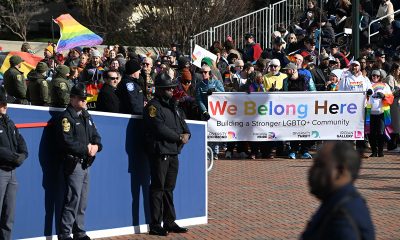Virginia
Trans lawmaker impacted by Va. redistricting changes
Roem placed in new district, will address political future after session ends
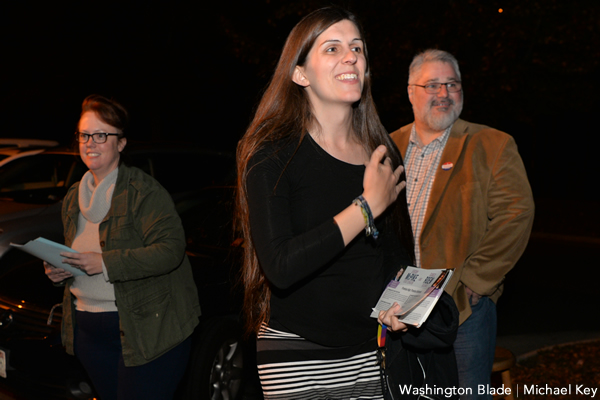
Sweeping changes in Virginia’s state legislative and congressional districts brought about by a redistricting order issued on Dec. 28 by the Virginia Supreme Court have significantly changed the makeup of the Manassas area district of Virginia House of Delegates member Danica Roem (D).
In 2018, Roem became the nation’s first out transgender person to be seated in a U.S. state legislature after she defeated longtime Republican incumbent and LGBTQ rights opponent Bob Marshall in the November 2017 election.
Roem, who is one of four out LGBTQ members of the Virginia General Assembly, appears to have been impacted the most by the redistricting among her three LGBTQ colleagues.
Gay state Sen. Adam Ebbin (D-Alexandria), gay state Del. Mark Sickles (D-Fairfax County), and lesbian state Del. Dawn Adams (D-Richmond area) were assigned new districts that retained most of their existing Democratic constituents or include new Democratic leaning areas, according to sources familiar with their districts.
State Del. Joshua Cole (D-Fredericksburg area), who identifies as bisexual, ended his tenure as a delegate this week after losing his re-election bid in the November election to Republican Tara Durant by 647 votes. The state’s redistricting changes place both Cole and Durant in a newly created 65th District that Stafford County Democratic Party activist Matt Rowe said makes the highly competitive district slightly more Democratic leaning.
Rowe said Cole, who the Blade was unable to reach for comment this week, indicated he plans to run again for the delegate seat in the next election.
The Virginia Supreme Court assumed the responsibility of redrawing the state’s congressional and state legislative districts under a state constitutional amendment approved by voters in a 2020 referendum. The redistricting measure approved by voters assigns the authority of creating the new districts to a bipartisan redistricting commission made up equally of Democrats and Republicans.
But the commission became deadlocked after each of the two-party representatives was unable to agree on a redistricting plan. Under a provision of the redistricting law, if the commission cannot reach an agreement, the matter is sent to the state Supreme Court, which appointed two redistricting experts called masters to redraw the state’s congressional and state legislative district maps to conform with population changes determined by the 2020 U.S. Census. One of the masters was selected by Democrats and the other by Republicans, according to a statement released by the court.
“We drew maps which did not unduly favor either party,” special masters Sean Trende and Bernard Grofman said in a statement. “These maps came about as part of a partisan and incumbency blind process based on good government map making,” the two said.
The changes made by the two masters carved Roem’s existing District 13 into three new districts – District 20, 21, and 22. Roem, who lives in the new District 20, is now the state delegate representing that district. Under rules established under the new redistricting law approved by voters, all the new districts took effect immediately on Dec. 28.
In response to a request by the Blade for her assessment of these changes, Roem said her new district consists of just six and a half of the 18 voter precincts that made up her former District 13. The other two-thirds of the precincts in her new district include residents that she had not represented before in Prince William County.
It couldn’t immediately be determined whether her new constituents are mostly Democrats, Republicans, independents, or a mix of all three.
“I live in the new House District 20 and will deal with my political future after this year’s Virginia General Assembly session ends in March,” Roem told the Blade in an email message.
“I’m confident the people of greater Prince William would continue to support me as a lifelong Prince William County resident from Manassas who served as their newspaper reporter for more than nine years from 2006-2015 before earning three terms now to serve them as a member of the Virginia House of Delegates,” she said.
“During my first two terms in office, the governor signed 23 of my bills into law – all with bipartisan support – including three bills to advance LGBTQ equality, so I’ve been effective at delivering for all of my constituents, LGBTQ residents included,” Roem said.
Gay Democratic activist Jim O’Connor of Prince William County, where Roem’s new district is located, said he believes the voter makeup of the new district would likely make it possible for her to win re-election in 2023 or possibly in 2022. Rowe, who said he also follows Prince William County politics, said he too thinks Roem is in a good position to win re-election whether in 2022 or 2023.
A lawsuit filed in federal court by some redistricting opponents is calling for a special House of Delegates election in 2022 on grounds that the redistricting resulted in large numbers of residents being represented by lawmakers they had no opportunity to vote for in an election, which may be in violation of the U.S. Constitution. The lawsuit is expected to be resolved sometime early this year to make it known whether a special Virginia House of Delegates election will take place this year in addition to the regularly scheduled election in 2023.
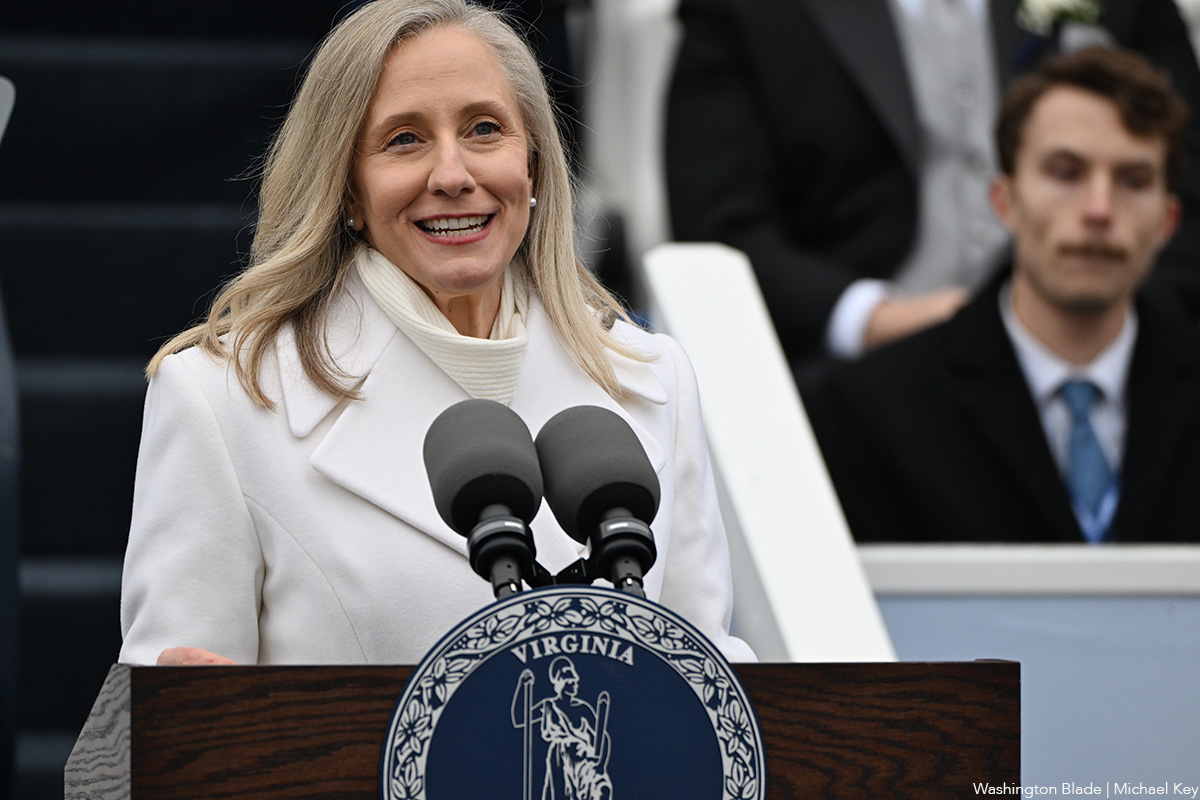
Abigail Spanberger was sworn in as the 75th governor of Virginia at a ceremony on the grounds of the Virginia State Capitol on Saturday. Thousands of spectators watched the swearing-in ceremony and parade, despite the rain and temperatures in the low 40s.
Spanberger, a member of the Democratic Party and an LGBTQ ally, became the first woman to be Virginia’s governor.
View on Threads
Newly-elected Attorney General Jay Jones, Lt. Gov. Ghazala Hashmi, and Spanberger were each administered the oath of office in the public ceremony.
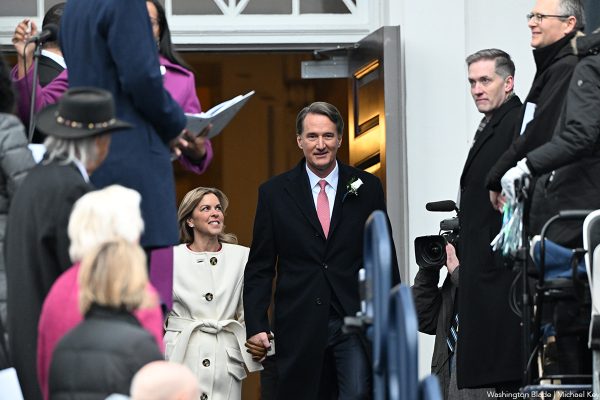
Republican former Gov. Glenn Youngkin left the ceremony shortly after the oath of office was administered to Spanberger and before the inaugural address.
In her speech, the new governor made an appeal to bipartisanship and looking past division in our current moment.
“To my friends in the General Assembly — on both sides of the aisle — I look forward to working with you,” said Spanberger. “I know what it means to represent your constituents, to work hard for your district, and to pursue policies you believe in. We will not agree on everything, but I speak from personal experience when I say that we do not have to see eye-to-eye on every issue in order to stand shoulder-to-shoulder on others.”
Spanberger acknowledged Virginians’ frustrations with federal layoffs and governmental policy.
“I know many of you are worried about the recklessness coming out of Washington. You are worried about policies that are hurting our communities — cutting healthcare access, imperiling rural hospitals, and driving up costs,” said Spanberger. “You are worried about Washington policies that are closing off markets, hurting innovation and private industry, and attacking those who have devoted their lives to public service.”
Spanberger alluded to the Trump-Vance administration, through never mentioned President Donald Trump’s name in her remarks.
Spanberger said, “you are worried about an administration that is gilding buildings while schools crumble, breaking the social safety net, and sowing fear across our communities, betraying the values of who we are as Americans, the very values we celebrate here on these steps.”
The new governor then spoke of her priorities in office, pledging to tackle housing affordability by working to “cut red tape” and increase housing supply. Spanberger also spoke of forestalling an impending healthcare crisis by protecting access and cracking down on “middlemen who are driving up drug prices.”
Spanberger spoke of investments in education at every level, standing up for workers (including the large number of federal workers in Virginia), and taking action on gun violence.
Virginia married couple Mary Townley and Carol Schall witnessed the inauguration ceremony from the stands set up on the grounds of the Capitol. Schall and Townley are one of the plaintiff couples in the case that challenged the Virginia constitutional ban on same-sex marriage.
Same-sex marriage became legal in Virginia in 2014.
“We are delighted with the inauguration of Abigail Spanberger as governor of Virginia,” Schall told the Washington Blade. “The celebration of her inauguration was full of the beautiful diversity that is Virginia. The Virginia Pride contingent was included as a part of what makes Virginia a great place to live.”
“Such an honor to attend such a wonderful event in Virginia history,” Townley told the Blade. “The weather before the Inauguration was cold and rainy, but I believe it represented the end of a dreary time and it ushered in the dry and sunny weather by the end of the inaugural parade. Madam Governor brought us to the light!”
The inaugural parade following the governor’s remarks included a contingent from Diversity Richmond and Virginia Pride. Marchers in the LGBTQ contingent carried a giant Progress Pride flag and were met with loud cheers from the gathered spectators.

Spanberger after her inauguration signed 10 executive orders. One of them bans discrimination against state employees based on sexual orientation, gender identity, and other factors.
“By virtue of the authority vested in me as Governor under Article V of the Constitution of
Virginia, I hereby declare that it is the firm and unwavering policy of the Commonwealth of Virginia to ensure equal opportunity in all facets of state government,” reads the executive order. “The foundational tenet of this executive order is premised upon a steadfast commitment to foster a culture of inclusion, diversity, and mutual respect for all Virginians.
Virginia
VIDEO: LGBTQ groups march in Va. inaugural parade
Abigail Spanberger took office on Saturday
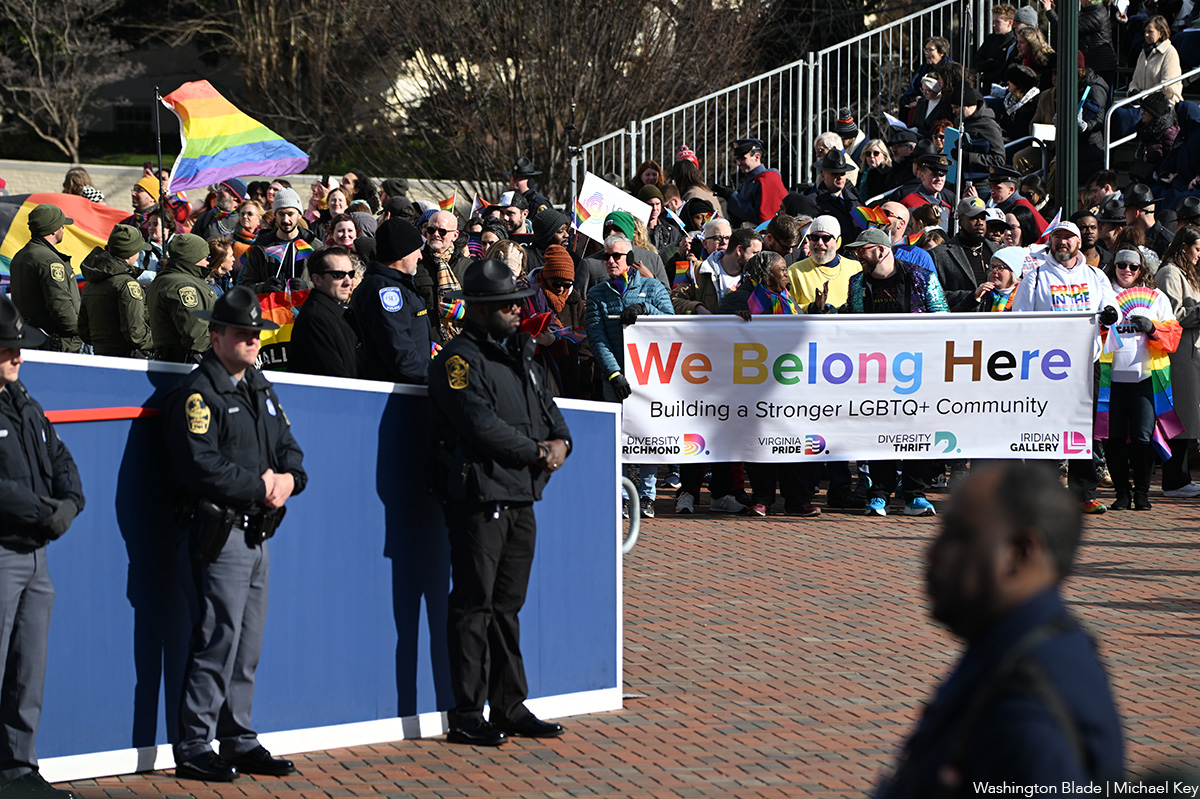
The inaugural ceremonies for Virginia Gov. Abigail Spanberger were held in Richmond, Va. on Saturday. Among the groups marching in the parade were Diversity Richmond and the Virginia Pride project of Diversity Richmond.
View on Threads
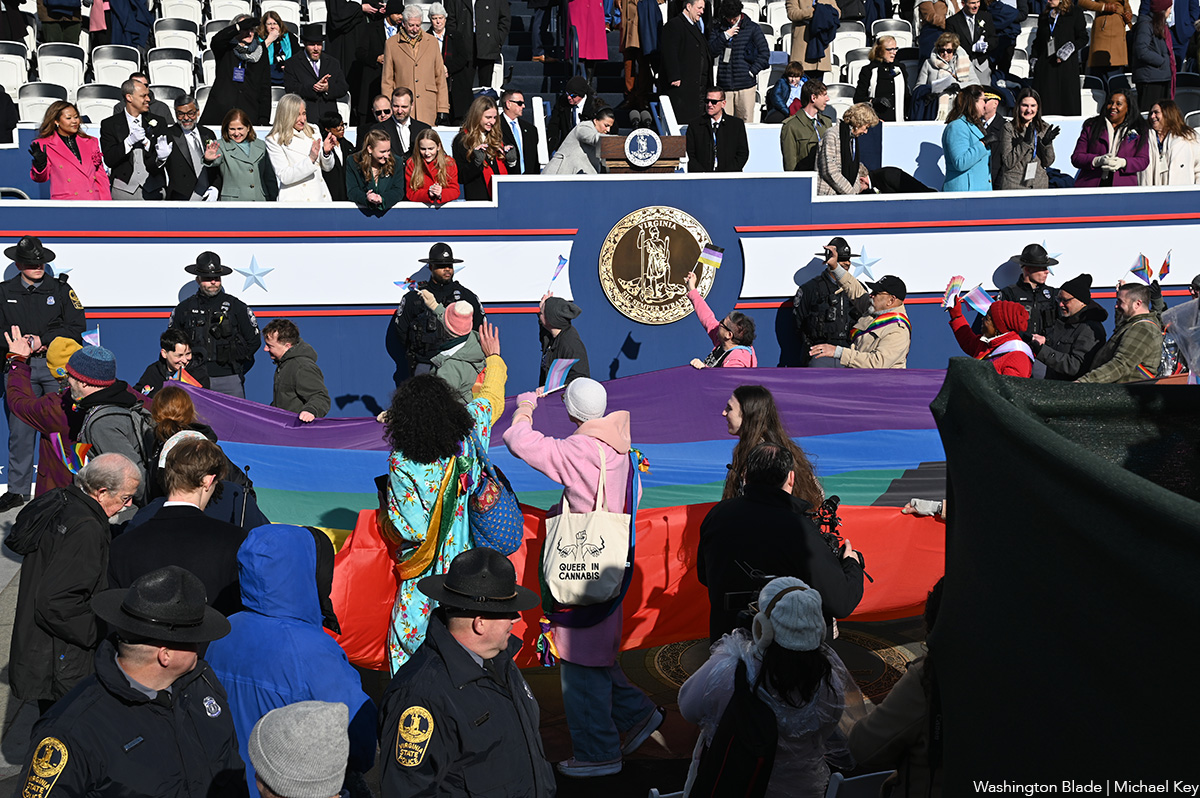
Virginia
Va. Senate approves referendum to repeal marriage amendment
Outgoing state Sen. Adam Ebbin introduced SJ3

The Virginia Senate on Friday by a 26-13 vote margin approved a resolution that seeks to repeal a state constitutional amendment that defines marriage as between a man and a woman.
Outgoing state Sen. Adam Ebbin (D-Alexandria) introduced SJ3. The Senate Privileges and Elections Committee on Wednesday approved it by a 10-4 vote margin.
Same-sex couples have been able to legally marry in Virginia since 2014. Outgoing Republican Gov. Glenn Youngkin in 2024 signed a bill that codified marriage equality in state law.
A resolution that seeks to repeal the Marshall-Newman Amendment passed in the General Assembly in 2021. The resolution passed again in 2025.
Two successive legislatures must approve the resolution before it can go to the ballot. Democrats in the Virginia House of Delegates have said the resolution’s passage is among their 2026 legislative priorities.
“It’s time for Virginia’s Constitution to reflect the law of the land and the values of today,” said Ebbin after Friday’s vote. “This amendment, if approved by voters, would affirm the dignity of all committed couples and protects marriage equality for future generations.”
-

 U.S. Supreme Court5 days ago
U.S. Supreme Court5 days agoSupreme Court hears arguments in two critical cases on trans sports bans
-

 Commentary5 days ago
Commentary5 days agoHonoring 50 queer, trans women with inaugural ‘Carrying Change’ awards
-

 District of Columbia5 days ago
District of Columbia5 days agoRuby Corado sentenced to 33 months in prison
-

 a&e features5 days ago
a&e features5 days agoVisible and unapologetic: MAL brings the kink this weekend





